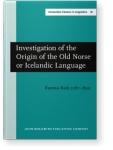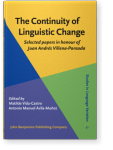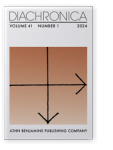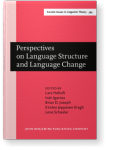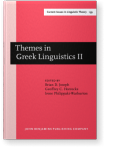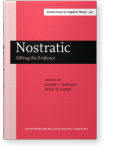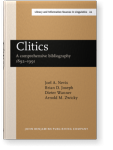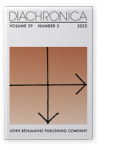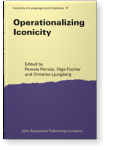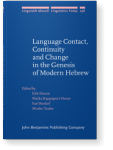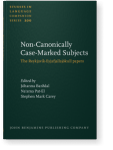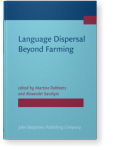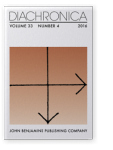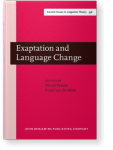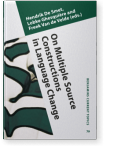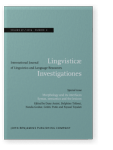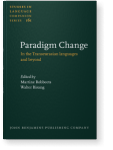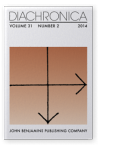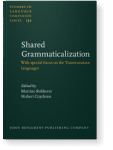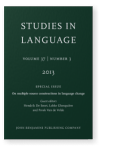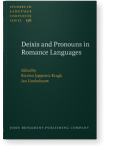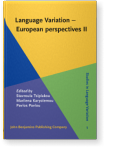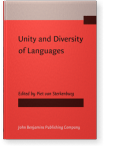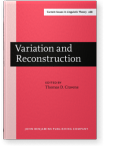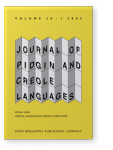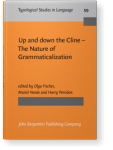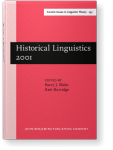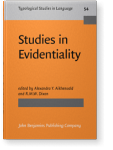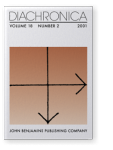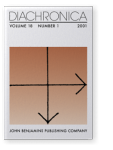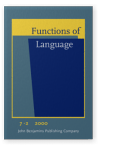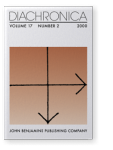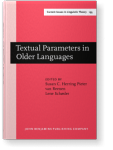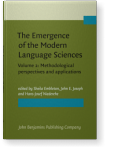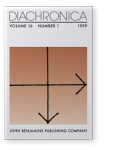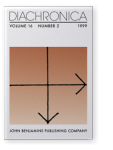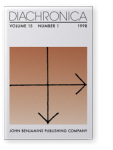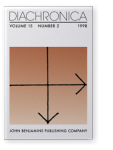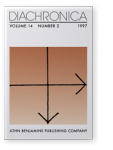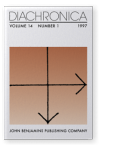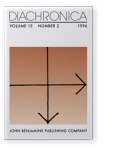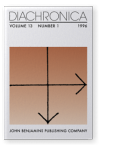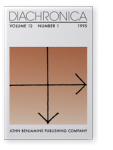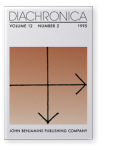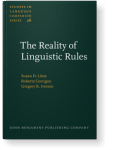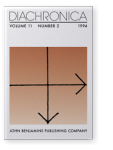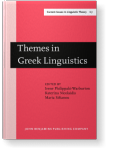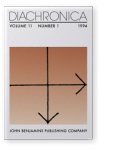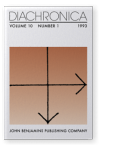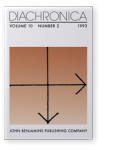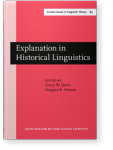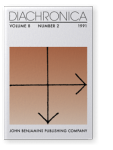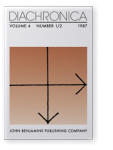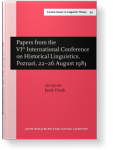Brian D. Joseph
List of John Benjamins publications for which Brian D. Joseph plays a role.
Book series
Journal
Perspectives on Language Structure and Language Change: Studies in honor of Henning Andersen
Edited by Lars Heltoft, Iván Igartua, Brian D. Joseph, Kirsten Jeppesen Kragh and Lene Schøsler
[Current Issues in Linguistic Theory, 345] 2019. ix, 419 pp.
Subjects Historical linguistics | Theoretical linguistics
Themes in Greek Linguistics: Volume II
Edited by Brian D. Joseph, Geoffrey C. Horrocks and Irene Philippaki-Warburton
[Current Issues in Linguistic Theory, 159] 1998. x, 335 pp.
Subjects Other Indo-European languages | Theoretical linguistics
Nostratic: Sifting the Evidence
Edited by Joseph C. Salmons and Brian D. Joseph
[Current Issues in Linguistic Theory, 142] 1998. vi, 293 pp.
Subjects Historical linguistics
Clitics: A comprehensive bibliography 1892–1991
Joel A. Nevis, Brian D. Joseph, Dieter Wanner and Arnold M. Zwicky
[Library and Information Sources in Linguistics, 22] 1994. xxxviii, 274 pp.
Subjects Bibliographies in linguistics | Morphology | Syntax
2022 Ernst Frideryk Konrad Koerner: In memoriam Diachronica 39:5, pp. 613–615 | Miscellaneous
2020 System-internal and system-external phonic expressivity: Iconicity and Balkan affricates Operationalizing Iconicity, Perniss, Pamela, Olga Fischer and Christina Ljungberg (eds.), pp. 105–122 | Chapter
The expressive function of language as realized phonically is explored here through an examination of the major role that affricates play in various Balkan languages, but especially Greek and Albanian, in marking words as showing emotion, affect, color, and similar sorts of expressive dimensions.… read more
2019 Andersen (1973) and dichotomies of change Perspectives on Language Structure and Language Change: Studies in honor of Henning Andersen, Heltoft, Lars, Iván Igartua, Brian D. Joseph, Kirsten Jeppesen Kragh and Lene Schøsler (eds.), pp. 13–34 | Chapter
Henning Andersen in his well-known and oft-cited (1973) article “Abductive and deductive change” (language 49(4).765–793) distinguishes two types of language change: evolutive change – defined as “change entirely explainable in terms of the linguistic system that gave rise to it” – and adaptive… read more
2019 Perspectives on language structure and language change: An introduction Perspectives on Language Structure and Language Change: Studies in honor of Henning Andersen, Heltoft, Lars, Iván Igartua, Brian D. Joseph, Kirsten Jeppesen Kragh and Lene Schøsler (eds.), pp. 1–10 | Chapter
2019 Can there be language continuity in language contact? Language Contact, Continuity and Change in the Genesis of Modern Hebrew, Doron, Edit, Malka Rappaport Hovav, Yael Reshef and Moshe Taube (eds.), pp. 257–286 | Chapter
The paper argues that contact-induced change is no more unusual or “inorganic” than any sort of language change, and that it does not affect the basic continuity that language transmission across generations ensures. Language continuity depends on an unbroken line of transmission, which may be… read more
2018 Chapter 2. Non-nominative and depersonalized subjects in the Balkans: Areality vs. genealogy Non-Canonically Case-Marked Subjects: The Reykjavík-Eyjafjallajökull papers, Barðdal, Jóhanna, Na'ama Pat-El and Stephen Mark Carey (eds.), pp. 23–54 | Chapter
The languages of the Balkan sprachbund are surveyed here with regard to their constructions that show non-nominative subjects, typically in impersonal constructions. The issue of origins is considered, specifically as to whether these constructions represent inheritances from some earlier stage of… read more
2017 Chapter 11. Expanding the methodology of lexical examination in the investigation of the intersection of early agriculture and language dispersal Language Dispersal Beyond Farming, Robbeets, Martine and Alexander Savelyev (eds.), pp. 259–274 | Chapter
Analysis of agricultural vocabulary remains one of the most compelling methodologies bearing on Renfrew’s Farming/Language Dispersal Hypothesis, by which the reconstructed lexicon for a proto-language of a well-dispersed language family is predicted to contain several agricultural items. Mostly,… read more
2016 Review of Dunkel (2014): Lexikon der indogermanischen Partikeln und Pronominalstämme Diachronica 33:4, pp. 538–542 | Review
2016 Being exacting about exapting: An exaptation omnibus Exaptation and Language Change, Norde, Muriel and Freek Van de Velde (eds.), pp. 37–55 | Article
For historical linguists, exaptation is an attractive notion, offering an overt link with biological evolution. Nonetheless, one can ask whether it represents something substantive about linguistic change or is merely an appealing metaphor. I critically assess exaptation, using case studies… read more
2015 Multiple sources and multiple causes multiply explored On Multiple Source Constructions in Language Change, De Smet, Hendrik, Lobke Ghesquière and Freek Van de Velde (eds.), pp. 205–221 | Article
Multiple sources abound in language, at all levels of linguistic analysis (phonology, syntax, semantics, etc.), and in a range of historical pursuits, including etymology and variationist investigations. From a methodological standpoint, moreover, recognizing multiple sources is often good… read more
2014 Morphology and syntax … and semantics … and pragmatics: Deconstructing “semantic agreement” Morphology and its interfaces: Syntax, semantics and the lexicon, Amiot, Dany, Delphine Tribout, Natalia Grabar, Cédric Patin and Fayssal Tayalati (eds.), pp. 306–321 | Article
Agreement minimally involves interaction between morphology and syntax, as a target’s features vary according to the morphological form of a controller in a given syntactic context. However, semantics can also play a role, and the term “semantic agreement” has been used to describe various… read more
2014 Chapter 4. On arguing from diachrony for paradigms Paradigm Change: In the Transeurasian languages and beyond, Robbeets, Martine and Walter Bisang (eds.), pp. 89–102 | Chapter
Paradigms hold a special place in most linguistic descriptions and are often crucial in linguistic reconstruction and in the determining genealogical relations. Nonetheless, theoreticians debate whether paradigms constitute a necessary basic construct or instead are secondary, deriving from other… read more
2013 Chapter 3. Demystifying drift: A variationist account Shared Grammaticalization: With special focus on the Transeurasian languages, Robbeets, Martine and Hubert Cuyckens (eds.), pp. 43–66 | Chapter
The notion of drift in language change has often been given a somewhat mystical interpretation, as a sort of linguistic “invisible hand”. However, it can be given substance through the recognition of proto-language variability. That is, if variable elements of a proto-language are inherited into… read more
2013 Multiple sources and multiple causes multiply explored On multiple source constructions in language change, De Smet, Hendrik, Lobke Ghesquière and Freek Van de Velde (eds.), pp. 675–691 | Article
Multiple sources abound in language, at all levels of linguistic analysis (phonology, syntax, semantics, etc.), and in a range of historical pursuits, including etymology and variationist investigations. From a methodological standpoint, moreover, recognizing multiple sources is often good… read more
2013 Deixis and person in the development of Greek personal pronominal paradigms Deixis and Pronouns in Romance Languages, Kragh, Kirsten Jeppesen and Jan Lindschouw (eds.), pp. 19–32 | Article
The historical development of the singular personal pronouns in Greek from the Classical language into Modern Greek is presented here with attention first of all to the ways in which sound change, analogy, and semantic change shape the paradigms. In addition, the role that the notions of deixis and… read more
2009 Broad vs. localistic dialectology, standard vs. dialect: The case of the Balkans and the drawing of linguistic boundaries Language Variation – European perspectives II: Selected papers from the 4th International Conference on Language Variation in Europe (ICLaVE 4), Nicosia, June 2007, Tsiplakou, Stavroula, Marilena Karyolemou and Pavlos Pavlou (eds.), pp. 119–134 | Article
Dialectology in large part is about drawing boundaries and charting the diffusion of linguistic features. Such pursuits have varied applications in the Balkans, where the spread of features, generally on a very localistic basis, often transcends the traditional distinctions between dialects and… read more
2008 Historical linguistics in 2008: The state of the art Unity and Diversity of Languages, Sterkenburg, Piet van (ed.), pp. 175–187 | Article
2006 On projecting variation back into a proto-language, with particular attention to Germanic evidence and some thoughts on “drift” Variation and Reconstruction, Cravens, Thomas D. (ed.), pp. 103 ff. | Article
2005 Review of McWhorter (2000): Language change and language contact in pidgins and creoles Creole Language in Creole Literatures, Mühleisen, Susanne (ed.), pp. 198–208 | Review
2004 Rescuing traditional (historical) linguistics from grammaticalization theory Up and down the Cline – The Nature of Grammaticalization, Fischer, Olga, Muriel Norde and Harry Perridon (eds.), pp. 45–71 | Article
2003 Reconsidering the canons of sound-change: Towards a ‘Big Bang’ theory Historical Linguistics 2001: Selected papers from the 15th International Conference on Historical Linguistics, Melbourne, 13–17 August 2001, Blake, Barry J. and Kate Burridge (eds.), pp. 205–219 | Article
2003 14. Evidentials Studies in Evidentiality, Aikhenvald, Alexandra Y. and R.M.W. Dixon (eds.), pp. 307–327 | Chapter
2001 Joseph’s Jottings — A Finale Diachronica 18:2, pp. 399–401 | Miscellaneous
2001 Review of Horrocks (1997): Greek: A history of the language and its speakers Diachronica 18:1, pp. 166–171 | Review
2001 Editorial: Time and change Diachronica 18:1, pp. 1–2 | Miscellaneous
2000 Jan Firbas 1921-2000 Functions of Language 7:2, pp. 273–277 | Obituary
2000 Review of Jasanoff, Melchert & Oliver (1998): Mír Curad: Studies in Honor of Calvert Watkins Diachronica 17:2, pp. 451–458 | Review
2000 Textual Authenticity: Evidence from Medieval Greek Textual Parameters in Older Languages, Herring, Susan C., Pieter van Reenen and Lene Schøsler (eds.), pp. 309 ff. | Article
1999 36. Romanian and the Balkans: Some comparative perspectives The Emergence of the Modern Language Sciences: Studies on the transition from historical-comparative to structural linguistics in honour of E.F.K. Koerner, Embleton, Sheila, John E. Joseph and Hans-Josef Niederehe (eds.), pp. 217 ff. | Article
1999 Editorial Diachronica 16:1, pp. iii–iv | Miscellaneous
1999 Joseph's Jottings — Turning a Ko(e)rner Diachronica 16:2, pp. 409–412 | Miscellaneous
1998 Publications Received/Ouvrages Reçus/Eingegangene Schriften Diachronica 15:1, pp. 189–205 | Section header
1998 Publications Received/Ouvrages Reçus/Eingegangene Schriften Diachronica 15:2, pp. 392–402 | Miscellaneous
1998 Introduction Nostratic: Sifting the Evidence, Salmons, Joseph C. and Brian D. Joseph (eds.), pp. 1 ff. | Chapter
1997 Publications Received/Ouvrages Reçus/Eingegangene Schriften Diachronica 14:2, pp. 397–404 | Miscellaneous
1997 Publications Received/Ouvrages Reçus/Eingegangene Schriften Diachronica 14:1, pp. 183–196 | Miscellaneous
1996 Publications Received/Ouvrages Reçus/Eingegangene Schriften Diachronica 13:2, pp. 395–406 | Miscellaneous
1996 Publications Received/Ouvrages Reçus/Eingegangene Schriften Diachronica 13:1, pp. 197–205 | Miscellaneous
1995 Publications Received/Ouvrages Reçus/Eingegangene Schriften Diachronica 12:1, pp. 147–154 | Miscellaneous
1995 Publications Received/Ouvrages Reçus/Eingegangene Schriften Diachronica 12:2, pp. 291–302 | Miscellaneous
1994 Systematic Hyperforeignisms as Maximally External Evidence for Linguistic Rules The Reality of Linguistic Rules, Lima, Susan D., Roberta Corrigan and Gregory Iverson, pp. 67 ff. | Article
1994 Review of Tonnet (1993): Histoire du grec moderne: La formation d’une langue Diachronica 11:2, pp. 279–281 | Review
1994 On weak subjects and pro-drop in Greek Themes in Greek Linguistics: Papers from the First International Conference on Greek Linguistics, Reading, September 1993, Philippaki-Warburton, Irene, Katerina Nicolaidis and Maria Sifianou (eds.), pp. 21 ff. | Article
1994 Publications Received/Ouvrages Reçus/Eingegangene Schriften Diachronica 11:1, pp. 147–156 | Miscellaneous
1994 Publications Received/Ouvrages Reçus/Eingegangene Schriften Diachronica 11:2, pp. 293–304 | Miscellaneous
1993 Publications Received/Ouvrages Reçus/Eingegangene Schriften Diachronica 10:1, pp. 151–164 | Section header
1993 Publications Received/Ouvrages Reçus/Eingegangene Schriften Diachronica 10:2, pp. 317–328 | Miscellaneous
1993 On the Development of PIE *gh/gh in Faliscan: A Response to Picard Diachronica 10:1, pp. 144–150 | Miscellaneous
1992 Diachronic explanation: putting speakers back into the picture Explanation in Historical Linguistics, Davis, Garry W. and Gregory Iverson (eds.), pp. 123 ff. | Article
1991 Is Faliscan a Local Latin Patois? Diachronica 8:2, pp. 159–186 | Article
SUMMARY Faliscan clearly shows affinities with Latin, but the exact nature of the relationship between the two languages has not met with complete acceptance. Some scholars treat Faliscan as nothing more than a 'rural dialect' of Latin, though the inexactness of the designation 'dialectal Latin'… read more
1987 On the Use of Iconic Elements in Etymological Investigation: Some Case Studies from Greek Diachronica 4:1/2, pp. 1–26 | Article
SUMMARY Iconic elements are generally held to be problematic for the purposes of etymological investigation, for they often show synchronic oddities and behave irregularly from a diachronic standpoint. However, it is possible, under the appropriate circumstances, to use such elements to advantage… read more
1985 Proto-Indo-European consonantism: methodological and further typological concerns Papers from the VIth International Conference on Historical Linguistics, Poznań, 22–26 August 1983, Fisiak, Jacek (ed.), pp. 313 ff. | Article
